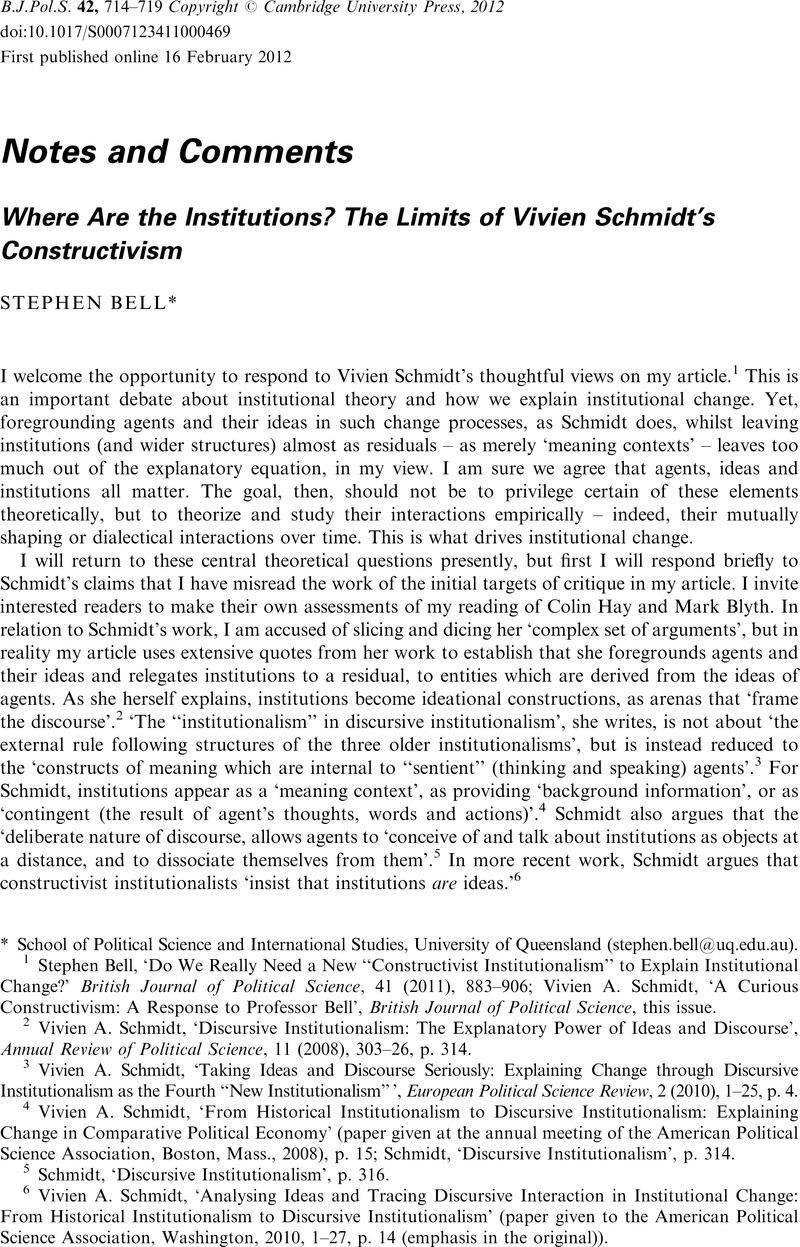Article contents
Where Are the Institutions? The Limits of Vivien Schmidt's Constructivism
Published online by Cambridge University Press: 16 February 2012
Abstract

- Type
- Notes and Comments
- Information
- Copyright
- Copyright © Cambridge University Press 2012
References
1 Bell, Stephen, ‘Do We Really Need a New “Constructivist Institutionalism” to Explain Institutional Change?’ British Journal of Political Science, 41 (2011), 883–906CrossRefGoogle Scholar; Schmidt, Vivien A., ‘A Curious Constructivism: A Response to Professor Bell’, British Journal of Political Science, this issueGoogle Scholar.
2 Schmidt, Vivien A., ‘Discursive Institutionalism: The Explanatory Power of Ideas and Discourse’, Annual Review of Political Science, 11 (2008), 303–326CrossRefGoogle Scholar, p. 314.
3 Schmidt, Vivien A., ‘Taking Ideas and Discourse Seriously: Explaining Change through Discursive Institutionalism as the Fourth “New Institutionalism” ’, European Political Science Review, 2 (2010), 1–25CrossRefGoogle Scholar, p. 4.
4 Schmidt, Vivien A., ‘From Historical Institutionalism to Discursive Institutionalism: Explaining Change in Comparative Political Economy’ (paper given at the annual meeting of the American Political Science Association, Boston, Mass., 2008), p. 15Google Scholar; Schmidt, ‘Discursive Institutionalism’, p. 314Google Scholar.
5 Schmidt, ‘Discursive Institutionalism’, p. 316Google Scholar.
6 Schmidt, Vivien A., ‘Analysing Ideas and Tracing Discursive Interaction in Institutional Change: From Historical Institutionalism to Discursive Institutionalism’ (paper given to the American Political Science Association, Washington, 2010, 1–27Google Scholar, p. 14 (emphasis in the original)).
7 Bell, ‘Do We Really Need a New “Constructivist Institutionalism”. See the discussion on these issues in Emanuel Adler, ‘Seizing the Middle Ground: Constructivism in World Politics’, European Journal of International Relations, 3 (1997), 319–363Google Scholar.
8 Schmidt, Vivien, ‘Institutionalism’, in Colin Hay, Michael Lister and David Marsh, eds, The State: Theories and Issues (London: Palgrave, 2006), pp. 98–117CrossRefGoogle Scholar, at p. 113.
9 Schmidt, Vivien, ‘A Curious Constructivism: A Response to Professor Bell’, British Journal of Political Science, 42 (2012)CrossRefGoogle Scholar, this issue.
10 For example, in Streeck, Wolfgang and Thelen, Kathleen, Beyond Continuity: Institutional Change in Advanced Political Economies (Oxford: Oxford University Press, 2005)Google Scholar.
11 Sven Steinmo and Kathleen Thelen, ‘Historical Institutionalism in Comparative Perspective’, in Thelen, Kathleen, Steinmo, Sven and Longstreth, Frankeds., Structuring Politics: Historical Institutionalism in Comparative Analysis (Cambridge: Cambridge University Press, 1992)Google Scholar.
12 Schmidt, ‘Analysing Ideas and Tracing Discursive Interaction in Institutional Change’, p. 9Google Scholar.
13 Steinmo and Thelen, ‘Historical Institutionalism in Comparative Perspective’, p. 9 and pp. 22–23Google Scholar.
14 Hattam, Victoria, Labor Visions and State Power: The Origins of Business Unionism in the United States (Princeton, N.J.: Princeton University Press, 1993)CrossRefGoogle Scholar, p. 12.
15 Streeck and Thelen, Beyond Continuity: Institutional Change in Advanced Political Economies; and James Mahoney and Kathleen Thelen, ‘A Theory of Gradual Institutional Change’, in Mahoney, James and Thelen, Kathleeneds., Explaining Institutional Change: Ambiguity, Agency and Power (Cambridge: Cambridge University Press, 2010)Google Scholar.
16 Streeck and Thelen,Beyond Continuity p. 15Google Scholar;. Mahoney and Thelen, ‘A Theory of Gradual Institutional Change’, p. 11Google Scholar.
17 Schmidt, ‘Analysing Ideas and Tracing Discursive Interaction in Institutional Change’, p. 18Google Scholar.
18 Schmidt, ‘A Curious Constructivism’Google Scholar.
19 As Scharpf puts it, institutions both ‘enable and constrain’ actors ( Scharpf, Fritz W., Games Real Actors Play: Actor Centered Institutionalism in Policy Research (Boulder, Colo.: Westview Press, 1997)Google Scholar, p. 36). See also, Clemens, Elizabeth S. and Cook, James M., ‘Politics and Institutionalism: Explaining Durability and Change’, Annual Review of Sociology, 25 (1999), 441–466CrossRefGoogle Scholar.
20 Schmidt, ‘A Curious Constructivism’Google Scholar.
21 Schmidt, ‘A Curious Constructivism’Google Scholar.
22 Streeck and Thelen, Beyond Continuity, p 8Google Scholar.
23 Dowding, Keith, ‘Agency and Structure: Interpreting Power Relations’, Journal of Power, 1 (2008), 21–36CrossRefGoogle Scholar.
24 Bell, Stephen, ‘How Tight Are the Policy Constraints? The Policy Convergence Thesis, Institutionally Situated Actors and Expansionary Monetary Policy in Australia’, New Political Economy, 10 (2005), 67–92CrossRefGoogle Scholar.
25 Bell, Stephen, ‘The Power of Ideas: The Ideational Shaping of the Structural Power of Business’, International Studies QuarterlyGoogle Scholar, forthcoming.
26 Schmidt, ‘Analysing Ideas and Tracing Discursive Interaction in Institutional Change’, p. 2Google Scholar.
27 Searle, John, The Social Construction of Reality (New York: The Free Press, 1995)Google Scholar; Schmidt, ‘Discursive Institutionalism’, p. 315Google Scholar.
28 Searle, The Social Construction of Reality, p. 28Google Scholar.
29 Adler, Emanuel, ‘Seizing the Middle Ground’, European Journal of International Relations, 3 (1997), 319–363CrossRefGoogle Scholar, p. 322.
30 Archer, Margaret, Structure, Agency and the Internal Conversation (Cambridge: Cambridge University Press, 2003)CrossRefGoogle Scholar, p. 2.
31 Guzzini, Stefano, ‘A Reconstruction of Constructivism in International Relations’, European Journal of International Relations, 6 (2000), 147–182CrossRefGoogle Scholar, p. 148.
32 Hay, Colin and Rosamond, Ben, ‘Globalisation, European Integration and the Discursive Construction of Economic Imperatives’, Journal of European Public Policy, 9 (2002), 147–167CrossRefGoogle Scholar, p. 147, emphasis added.
33 Schmidt, ‘Analysing Ideas and Tracing Discursive Interaction in Institutional Change’, p. 14Google Scholar.
- 19
- Cited by


